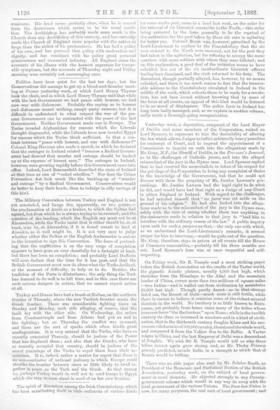Yesterday week, a deputation, composed of the Lord Mayor of
Dublin and some members of the Corporation, waited on Lord Spencer, to represent to him the desirability of altering the law which allows. Judges to inflict arbitrarily heavy penalties for contempt of Court, and to request the appointment of a Commission to inquire on oath into the allegations made by Mr. Gray, M.P., the Sheriff of Dublin, in the Freeman's Journal, as to the challenges of Catholic jurors, and into the alleged misconduct of the jury in the Hynes case. Lord Spencer replied that he had received the memorialists in token of his respect for the privilege of the Corporation to bring any complaint of theirs to the knowledge of the Government, but that ho could not discuss with them the propriety of Mr. Justice Lawson's pro- ceedings. Mr. Justice Lawson had the legal right to do what he did, and would have had that right as a Judge of any Court in either England or Ireland. With regard to the challenges, he had satisfied himself that " no juror was set aside on the ground of his religion." He had also looked into the allega- tions made as to the misconduct of the jury in the Hynes case, solely with the view of seeing whether there was anything in the statements made in relation to that jury to "lead him to interfere with the ordinary course of the law." A public inquiry upon oath for such a purpose as that,—the only one with which, as we understand the Lord-Lieutenant's remarks, it seemed proper for him to intervene,—would. be quite out of the question. Mr. Gray, therefore, stays in prison at all events till the House of Commons reassembles,—probably till his three months are out. Lord Spencer's tone was at once respectful and self- respecting.






























 Previous page
Previous page